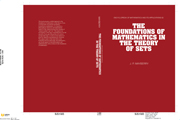7 - Axiomatic Set Theory
from Part Three - Cantorian Set Theory
Published online by Cambridge University Press: 05 March 2012
Summary
The Zermelo–Fraenkel axioms
The Zermelo–Fraenkel system of set theory is based on the notion of set that is the common property of all mathematicians. Indeed, my own exposition of set theory has been based on it. But now I want to consider that system as a formal axiomatic theory of the conventional sort. Of course it follows, as a matter of logic, that this theory, qua formal axiomatic theory, cannot serve directly as a foundation for mathematics; nevertheless its study is of central importance for set theory, properly so called, and therefore for the foundations of mathematics.
Zermelo's own version of the theory was not formalised but was implicitly of second order. I shall consider both first and second order formal versions of his theory, ZF1 and ZF2, respectively. In his axioms Zermelo made provision for individuals that are not sets (Urelementen), but in modern treatments the formal theories deal only with pure sets, so that in models of them everything is “built up from the empty set”. I shall follow the modern approach here.
Both of the formal theories ZF1 and ZF2 are based on the same primitive, non-logical vocabulary, a single binary predicate constant “∈” for membership, so that ℒ(ZF2) – the formal language of ZF2 – differs from ℒ(ZF1) only in the presence of function and predicate variables of all orders.
- Type
- Chapter
- Information
- The Foundations of Mathematics in the Theory of Sets , pp. 237 - 258Publisher: Cambridge University PressPrint publication year: 2001

